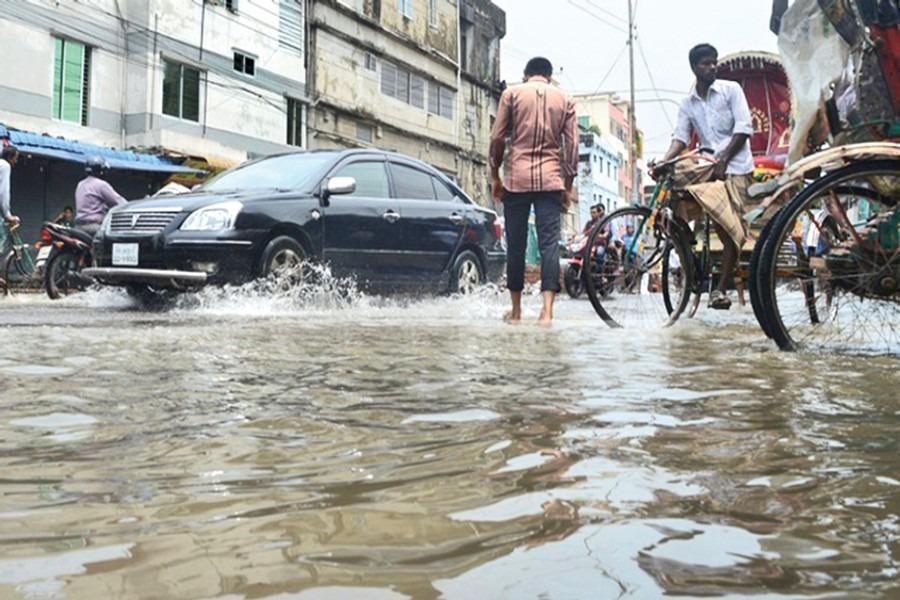
Published :
Updated :

If the commitments made by the two mayors of Dhaka City materialised, waterlogged roads, lanes and by-lanes should have been a thing of the past by now. Sadly, it has not happened. Heavy rainfall for only two hours in the last Saturday's afternoon left roads in several areas of the city under knee-deep to waist-deep inundation. With moderate to heavy showers, this happened in the past week. Does this mean the promises made by the two mayors who enthusiastically embarked on cleaning the drainage system and the 51 canals they were handed over in 2021 have been empty? The several times more expenditures than before to drain out rainwater have all gone down the drain? Not quite! Water from the 13 major waterlogged hotspots out of a total number of 48 hotspots took three to four days to recede in the past but now reportedly it takes an hour to two.
This surely is an improvement but in case of heavier rains and for a longer time, the situation may be worse. Now here is an indication that all is not lost yet. What is missing most from the initiatives by the two mayors is coordination between them and with several other agencies still controlling water bodies and facilities for maintaining water flows. The two city corporations have got the controlling authorities of the canals but they are yet to receive the authority of 52 sluice gates, a pumping station from the Water Development Board and 25-kilometre long lake and 300 kilometres of water bodies. In a city where 17.67 per cent water bodies have disappeared over the past 28 years, the need for preserving the water retention areas cannot be overemphasised. It is also highly concerning that in the past 100 years, the number of ponds has come down to only 24 from 120 in the old town alone. In a city where concrete cover leaves hardly any vacant space for rainwater to seep in, these ponds could act as effective water receptacles.
A lack of coordination, despite expenditure of billions of taka by the agencies concerned since 2001 when the Dhaka WASA (water and sewerage authority) undertook the project, 'Capital Waterlogging Elimination Project', has primarily been responsible for not developing an effective system to flush out rainwater quickly. The canals were excavated and cleaned after the city corporations took over but in the absence of public awareness they get clogged. Here the responsibility of the city's inhabitants is crucial as well. From polythene to discarded plastic and wooden furniture to bamboo baskets, to torn carpets, pillows and mattresses ---everything out of use is thrown into city canals. The consequences are disastrous.
Clearly, both city authorities and its inhabitants must have a shared responsibility to keep the canals and drains clean. However, the city corporations should deploy monitoring teams to maintain the drains' and canals' unhindered flows. If the authorities have failed the city people, the latter, as responsible citizens, should as well respond to the call of duty. For a comprehensive system to work, the city corporations should have their jurisdiction over the water bodies and facilities within the city areas and on its periphery still under the control of other agencies. There has been some improvement in flushing out rainwater, but the system has to be made fully functional for the purpose.


 For all latest news, follow The Financial Express Google News channel.
For all latest news, follow The Financial Express Google News channel.